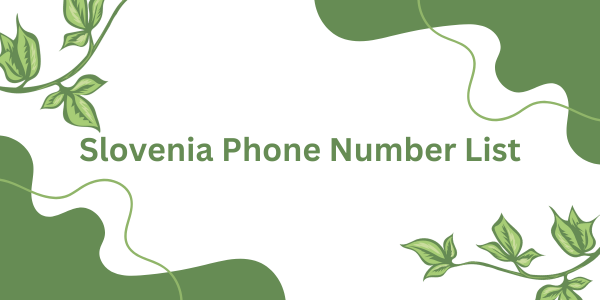|
|
Slovenia officially joined the European Union (EU) on May 1, 2004, marking a significant step in its post-independence journey toward integration into European political and economic structures. Slovenia's accession to the EU was part Slovenia Phone Number List of a broader wave of Eastern European countries seeking to align with Western European institutions after the end of the Cold War and the dissolution of socialist states.
After gaining independence in 1991, Slovenia began implementing reforms to meet the Copenhagen criteria, which are the essential standards for joining the European Union. These criteria include stable democratic institutions, functioning market economies, adherence to the rule of law, and the acceptance of EU legislation. Slovenia's strategic position, economic growth, and commitment to reforms supported its goal of EU integration.
Slovenia applied for EU membership in 1996, and by 2003, it was well on its way to accession after successfully completing the required negotiations. The accession negotiations focused on areas such as economic policies, judicial reforms, the Schengen Agreement, and the adoption of EU laws and regulations. Slovenia was one of the most prepared and advanced candidates in the EU accession process, demonstrating both political stability and a functioning market economy.
On May 1, 2004, Slovenia became part of the European Union alongside nine other countries (Cyprus, Czech Republic, Estonia, Hungary, Latvia, Lithuania, Malta, Poland, Slovakia, and Slovenia). This group of nations represented the EU's largest single expansion, as these countries sought greater economic and political stability by joining the Union.

Joining the European Union brought several advantages for Slovenia. The country gained access to the EU's single market, which enhanced trade opportunities and economic growth. It also received EU funding and support for development projects and infrastructure. Furthermore, membership facilitated the free movement of goods, services, capital, and people across borders, aligning Slovenia with the standards and values of European cooperation.
Following its EU accession, Slovenia successfully joined the USA Phone number Database Schengen Area in 2007, allowing for border-free travel across most of Europe. In 2007, Slovenia also adopted the Euro, becoming the first of the newer EU member states to do so, showcasing its commitment to deeper integration into European economic frameworks.
In conclusion, Slovenia's accession to the European Union on May 1, 2004, represented a major milestone in its modern history. It symbolized Slovenia's commitment to European integration, economic development, and democratic governance while providing numerous opportunities for growth and international cooperation.
|
|